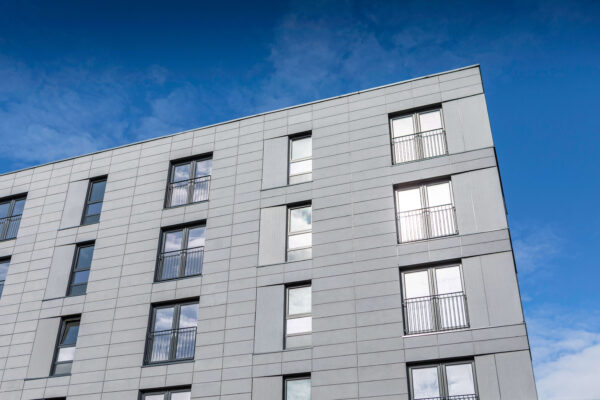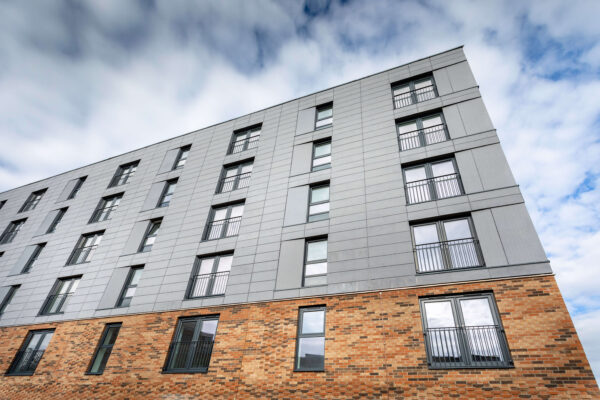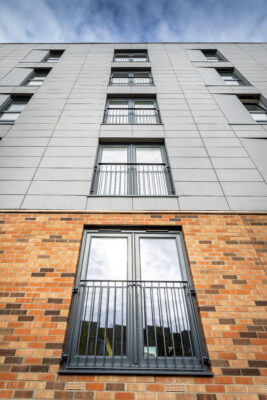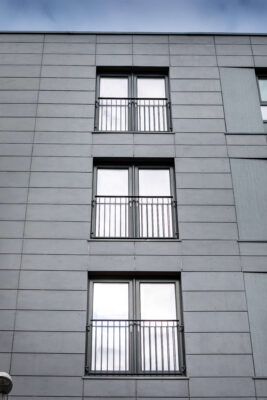







Approved Spectus fabricator Sidey supplied and installed over 200 Flush Tilt and Turn windows for a low-rise apartment block that forms part of Places for People’s Waterfront 3 development in Edinburgh.
Designed by Reiach and Hall Architects, this contemporary project provided 34 homes for affordable rent built using a mix of traditional and timber-framed modular construction. Waterfront 3 is the third phase of a high density development. The wider development provides a total of 89 mixed- tenure homes across a 0.9 hectare site.
Mike Rutland business development manager at ModularWise said: “This was a fairly unusual development in that it mixed traditional build with modular. The ground floor of the scheme was built using traditional construction methods and consists of seven apartments, while the upper three floors consist of 27 modular apartments.
“The groundworks and foundations of the building were completed as normal, the construction company Allenbuild then built the traditionally constructed ground floor.
“While this work was going on we were fabricating the modules for the upper floors in our factory in Knighton, Powys, Mid-Wales. The modules are precision engineered, volumetric (three dimensional) timber framed structures, which include all fixtures and fittings, including windows, kitchens and bathrooms, and are fully decorated before leaving the factory.
“Factory manufacturing can offer a range of advantages over traditional construction. The quality of the build is much better as construction occurs in a controlled environment rather than out in the elements. This means that the costs of remedial work due to poor quality construction are practically negated. Also, wastage is significantly reduced; typically on site you would expect 19% of materials to end up in landfill, where as in our factory we can get that down to around 1.5%.”
Mike said: “The Spectus flush tilt and turn windows were chosen for the project because they combine contemporary looks and large aperture with high performance, including low U-values of 1.4.
“We took full advantage of the Spectus design service, which includes wind and barrier loading, ventilation and acoustic requirements.
“Spectus Window System’s SER certification provides evidence that the glazing meets the relevant structural integrity codes of practice, which we needed for the warrant stage. Their expertise makes the process so much smoother.
“The Sidey team was very flexible and were happy to install the windows of the traditionally built ground floor on site, and the rest to the modules in our factory in Wales.”
Mike continued: “Once the traditionally constructed ground floor was completed, the modules were transported to site by lorry and delivered a floor at a time. The landing sequence was completed over a four week period – a significant time saving versus traditional construction.
“On site, connector plates were fitted at the external ‘roofs’ of the modules, and angle steel connectors were fitted at the corners of the modules to connect modules, so that they ultimately act as one homogenous building.
“The only additional works required after the modules were put into position, was the erection and fitting of steel walkways, and the installation of the lifts and external cladding.
“Because manufacturing occurs before and during groundworks on site, significant time savings are made in construction, which translates into cost savings for the client.
“To ensure cost savings are made one area that requires careful planning is in the transportation of modules from factory to site. Consideration needs to be given to module size in the design process so that lorries don’t require costly police escorts.”
Mike said: “It’s crucial for us to work with suppliers who offer quality products, including relevant industry certification, which not only ensures a quality finish and high performance, but which enable us to meet the requirements for warranty and finance.”
Mike concluded: “Spectus Window Systems is a pleasure to work with and we look forward to working with them on future developments.
“Our client, Places for People, is extremely pleased with the project which will provide much needed quality affordable housing for the people of Edinburgh.”
Spectus is a trading name of Specialist Building Products Limited, a wholly owned subsidiary of the Epwin Group Plc. Specialist Building Products Limited is registered in England & Wales, Company Registration number: 1268689, Registered Office: Friars Gate, 1011 Stratford Road, Solihull, B90 4BN, VAT Registration No. 864 4507 10